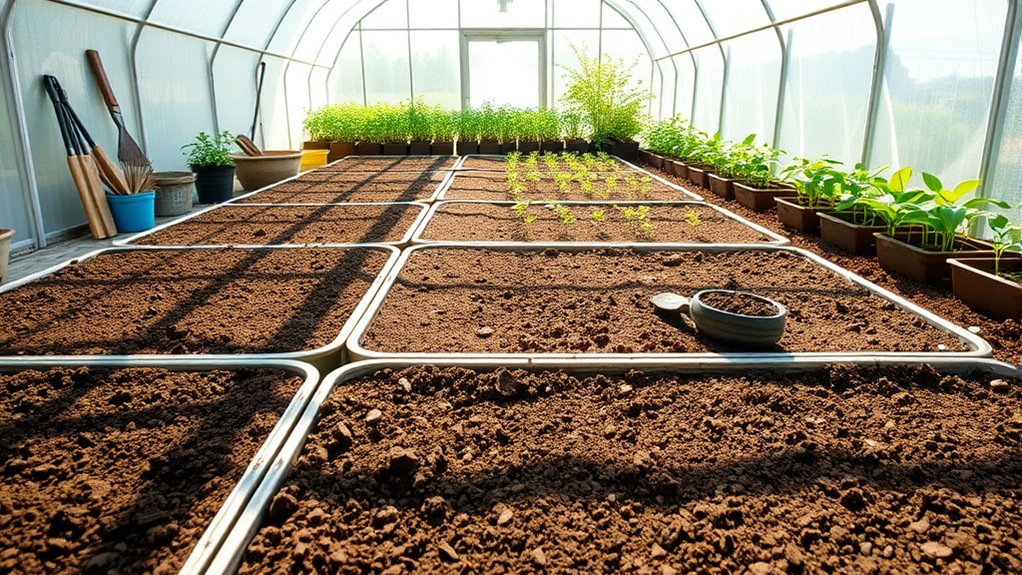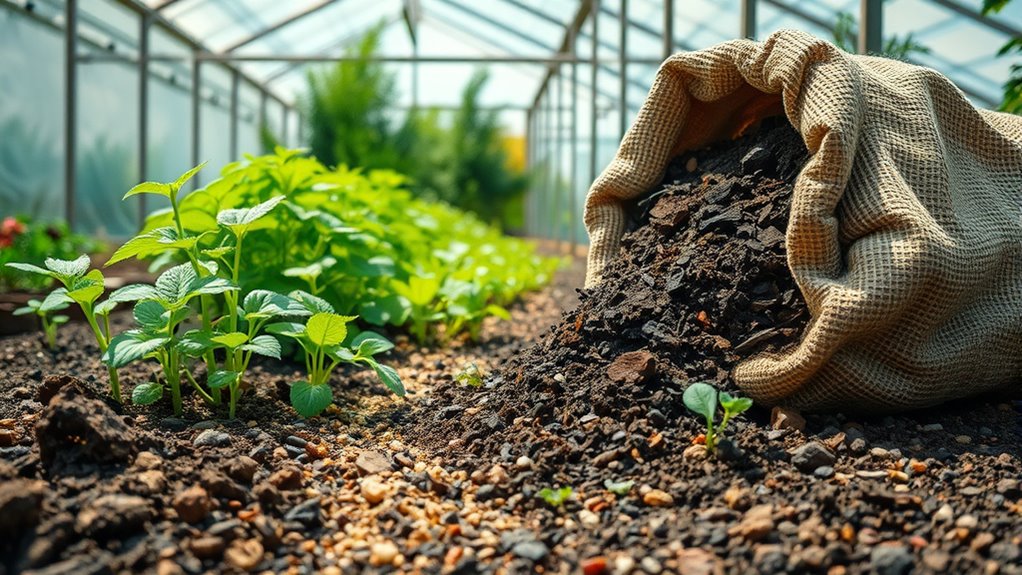To boost your greenhouse’s soil health organically, use compost tea to introduce beneficial microbes and nutrients directly to your plants. Incorporate biochar to improve soil structure, water retention, and nutrient holding capacity, creating a thriving environment for roots. Combining these amendments enhances nutrient cycling and plant resilience. Regular application guarantees ongoing microbial activity and soil vitality. Keep exploring ways to optimize your soil, and you’ll discover even more benefits for healthy, productive plants.
Key Takeaways
- Incorporate organic fertilizers and amendments like compost tea and biochar to enhance soil vitality and plant health.
- Use compost tea regularly to supply beneficial microbes, nutrients, and organic compounds directly to plant roots.
- Apply biochar to improve soil structure, water retention, and nutrient-holding capacity while supporting microbial activity.
- Combine compost tea with biochar to boost microbial diversity and nutrient cycling for resilient greenhouse soils.
- Ensure proper application practices, such as charging biochar and consistent compost tea use, to maintain a healthy, productive environment.

Organic fertilizers and soil amendments play a pivotal role in maintaining healthy, productive greenhouse environments. When you focus on enriching your soil with natural inputs, you create an ecosystem that supports vigorous plant growth and resilience against pests and diseases. One effective way to boost soil vitality is through compost tea, a nutrient-rich liquid derived from steeping compost in water. This brew delivers essential minerals, beneficial microbes, and organic compounds directly to your plants’ roots, enhancing nutrient uptake and promoting overall health. Regularly applying compost tea can help maintain a lively microbial community in the soil, which is essential for breaking down organic matter and releasing nutrients in a form that plants can absorb efficiently.
Alongside compost tea, biochar application stands out as a powerful soil amendment for greenhouse growers. Biochar, a form of charcoal produced through pyrolysis, improves soil structure, increases water retention, and enhances nutrient retention. When you incorporate biochar into your soil, you create a habitat for beneficial microbes, which further supports healthy plant growth. Its porous nature enables it to hold onto nutrients that might otherwise leach away, making them available over time. This means fewer nutrient losses and less need for frequent fertilization, which is both cost-effective and environmentally friendly. Biochar also helps regulate soil pH, providing a more stable environment for a variety of plants and reducing the likelihood of nutrient deficiencies.
Using compost tea and biochar together can amplify their benefits. Compost tea introduces active microbes that can colonize biochar’s porous surface, forming a symbiotic relationship that boosts microbial diversity and activity. This synergy enhances nutrient cycling and promotes a resilient soil ecosystem, which is especially important in the controlled environment of a greenhouse. When applying compost tea, aim for consistency—weekly or biweekly feedings help maintain microbial populations and nutrient availability. For biochar, ensure it’s properly aged or “charged” with nutrients before mixing it into your soil. This step prevents any potential nitrogen drawdown that can occur when biochar initially absorbs nutrients. Additionally, understanding the importance of soil health can guide growers in creating a thriving environment for their plants.
Frequently Asked Questions
How Do Organic Fertilizers Compare to Synthetic Options in Nutrient Release?
Organic fertilizers typically offer slower nutrient release compared to synthetic options, providing more consistent nutrient availability over time. You’ll notice that organic fertilizers release nutrients gradually, aligning with plant needs and reducing the risk of leaching. Synthetic fertilizers, however, release nutrients quickly, which can lead to rapid growth but may cause nutrient runoff. Choose organic fertilizers if you want steady release timing and balanced nutrient availability for healthier plants.
What Are the Environmental Impacts of Using Organic Amendments in Greenhouses?
Using organic amendments in your greenhouse positively impacts the environment by promoting carbon sequestration, which helps reduce greenhouse gases. Additionally, these amendments enhance biodiversity by supporting beneficial soil organisms and creating a healthier ecosystem. You’ll also minimize pollution and runoff compared to synthetic options. Overall, adopting organic amendments fosters sustainable practices, protecting your environment while maintaining productive, healthy plants in your greenhouse.
Can Organic Fertilizers Be Used Effectively in Hydroponic Greenhouse Systems?
Yes, you can use organic fertilizers effectively in hydroponic greenhouse systems. Focus on organic fertilizer compatibility with your hydroponic setup to make certain nutrients are absorbed properly. Choose organic amendments that support sustainability, minimizing environmental impact. You’ll need to monitor nutrient levels closely, as organic options may release nutrients more slowly. With proper management, organic fertilizers can provide healthy, eco-friendly growth in your hydroponic system.
How Often Should Soil Amendments Be Reapplied for Optimal Plant Health?
You should reapply soil amendments based on their timing schedules and amendment longevity, which can vary widely. For most organic amendments, aim for every 4 to 6 weeks, but monitor plant health closely to adjust as needed. Ignoring signs of deficiency or excess can harm your plants. Regularly evaluating your soil guarantees you maintain ideal conditions, preventing deficiencies before they become problems and keeping your greenhouse thriving.
Are There Specific Organic Amendments Suited for Different Greenhouse Crops?
Yes, you should use crop-specific amendments and tailored formulations for your greenhouse crops. Different plants have unique nutrient needs, so selecting amendments designed for specific crops guarantees ideal growth and health. For example, leafy greens benefit from nitrogen-rich amendments, while fruiting plants thrive with potassium-focused formulations. By choosing the right organic amendments for each crop, you promote vigorous growth, better yields, and healthier plants overall.
Conclusion
Just like a master chef crafts a perfect dish, you can nurture your greenhouse with organic fertilizers and soil amendments. Remember, as the wise gardener once said, “The health of your plants reflects the health of your soil.” By choosing natural solutions, you set the stage for thriving, vibrant plants. Embrace these organic methods, and watch your greenhouse flourish—turning your green space into a lush, sustainable paradise, much like a well-tended garden of Eden.








